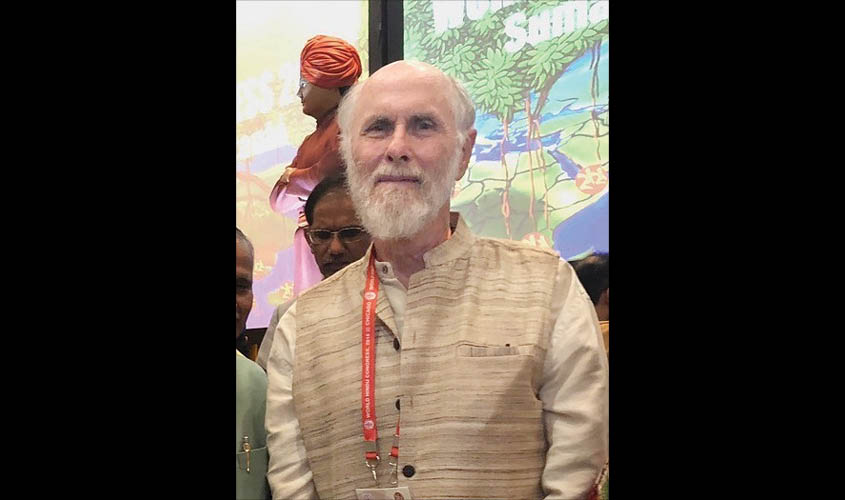‘Dharmik forces must stay in power in India for the Vedic traditions to renew themselves and gain their proper respect.’
Dr David Frawley, who has rechristened himself as Pandit Vamadeva Shastri, is an American Vedic teacher. Founder of American Institute of Vedic Studies, Frawley is the author of 50 books published in 20 languages worldwide. His fields of expertise include Yoga, Ayurveda, Vedanta and ancient Vedic texts. He has also written extensively on historical, social and cultural issues facing Hindu religion and India today. He has been active for several decades teaching the Vedic knowledge throughout the world, including helping found several Vedic schools and associations
Q: What are the core values of the Vedas and the Vedic sciences?
A: Vedic knowledge is vast and comprehensive and consists of numerous branches like Yoga, Vedanta, Ayurveda, Jyotish and Sanskrit, with Vedic texts and their commentaries. It extends to Ramayana, Mahabharata and Puranas and all that came out of these. Vedic knowledge provides a broad view of the universe and dharmik values like Yama and Niyama, Tapas, Swadhyaya, Satya, and so on. Vedic studies teach us how to live a dharmik life in harmony with the conscious universe, honouring all life as sacred. Vedic knowledge deals with all the goals of life from health and well-being to creativity and spirituality. It teaches us to recognise our true immortal Self and how a human being reflects the entire universe. It recognises the cosmic element in everything, large or small, animate or inanimate.
Q: There is little awareness about the importance of Vedic knowledge in India. What are the reasons and how Vedic knowledge could be imparted to the new generation?
A: Vedic knowledge and values are thousands of years old. It has diversified in many ways. But many people in India have forgotten the Vedic values and wisdom that underly India’s civilisation. This knowledge is reflected in art, culture, music, dance, and temple worship as well as spiritual approaches. It is behind the many systems of Yoga and Vedanta. But people have forgotten the connections. In fact, there are those who do not want the people to recognise these and would prefer to hide them. Yet there are also growing efforts to revive Vedic knowledge and its different aspects.
Q: What are the reasons for this loss of connect?
A: There are many reasons for the denigration of the Vedic system, its views and values. For example, the British closed Ayurvedic schools along with much of traditional education in India. Of course, there were religious, commercial and political reasons as well. There were distortions in history, ignoring the greatness of India’s civilisation going back to the Vedas. There was little recognition of India’s contributions to science, mathematics, astronomy, surgery etc.
Q: Do you think long years of foreign rule contributed to this phenomenon?
A: Yes. Both British and Islamic rules were colonial in nature and wanted to supplant or subordinate India’s native culture. But even post-1947, the Nehruvian and Left mindset tried to reject Bharatiya traditions and make India their own modern invention. This happened despite the fact that many “Bharatiya elements” had a great impact on the society during the freedom struggle, like Ramakrishna Paramahansa, Mahatma Gandhi, Swami Vivekananda, Aurobindo Ghosh, etc.
Q: What do you think of the current situation?
A: Vedic knowledge and culture is rising again, though for that reason facing new challenges from many sides. The Central government supports it, though much of the Opposition does not, and, therefore, I believe the next elections are going to be very crucial. There are many ground level challenges at bureaucratic and institutional levels, which change slowly. Yet the mindset of the people is changing, honouring India’s dharmik heritage and yogic traditions.
There are overall challenges related to the economy, foreign affairs and India’s place in the world. Moreover, there are challenges from outside, from those who follow political ideologies or religious dogmas against any Vedic revival. You saw the attempt to sabotage the World Hindu Congress in Chicago. But in spite of this, the Hindu voice is coming out again. For this to succeed, collective and concerted efforts are needed. But it will take time to create lasting changes. Dharmik forces must stay in power in India for the Vedic traditions to renew themselves and gain their proper respect.
Looking at the Western world, I think the term “Hindu” is more positive now because of the success of the Hindu diaspora. Yet there is a change in paradigm even in India. For example, in India’s politics, those who were anti-Hindu are now trying to appear to have a “soft Hindu” view. You can see they are now visiting temples as part of their campaigns. In case of India, it’s not just about creating a nation; it’s about developing the Indian culture and reviving the dharmik heritage, values and traditions.
How Vedic knowledge is relevant in present day world, which is full of hatred, intolerance and terrorism?
A. The world today has both great technological progress on one side but growing inequality and unhappiness on the other. There are major social problems like drug addiction, breakdown of the family, social and national divisions, and rampant commercialisation. Vedic knowledge teaches you to lead a life based on dharmik values, which is integrated with nature. Dharmik teachings have a lot to offer to humanity for a more peaceful world. The world is looking to India for spiritual guidance. The goal of life is to understand the eternal and the infinite, the universe as a whole, and this is part of the Vedic vision and its many systems of knowledge and practice.

